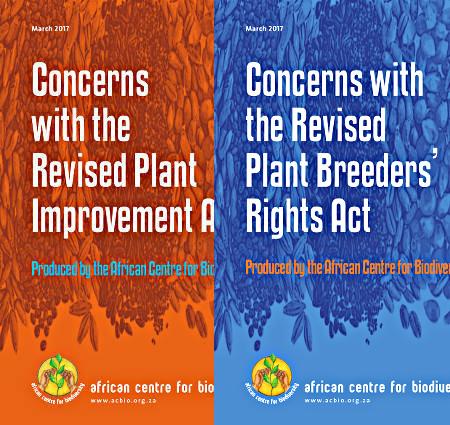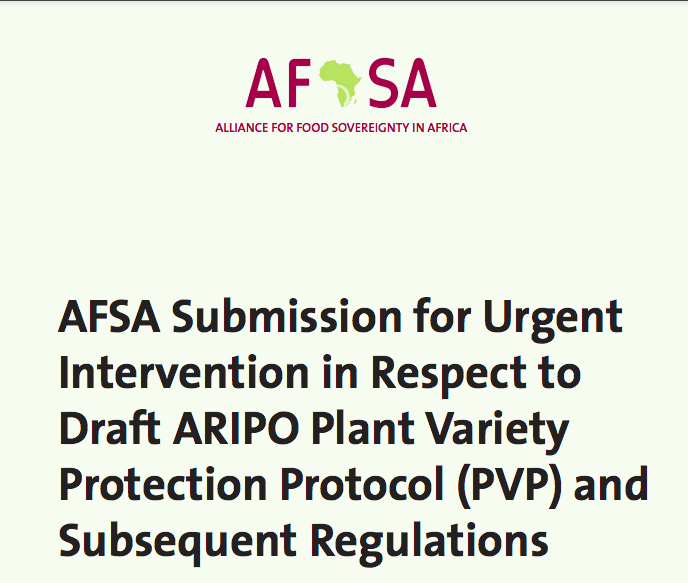Latest Resources

30 April 2019
Oxitec’s failed GM mosquito releases worldwide: Forewarnings for Africa and the Target Malaria pr...
A decade ago, genetically modified (GM) mosquitoes were first released globally, in the Cayman Islands, by UK-based company Oxitec. Further releases followed in Malaysia, Panama and Brazil. In a public relations whitewash, Oxitec has repeatedly claimed that the experiments successfully wiped out nearly 90% of the Aedes aegypti mosquito population, which is one of the […]

17 September 2018
The SADC PVP Protocol: Blueprint for uptake of UPOV 1991 in Africa
In the recently published discussion paper, ‘The SADC PVP Protocol: Blueprint for uptake of UPOV 1991 in Africa’, Sabrina Masinjila and Mariam Mayet, provide an updated critique on the regional Plant Variety Protection (PVP) system developed under the auspices of the Southern African Development Community (SADC) – the SADC PVP protocol – adopted by the […]

20 June 2018
What Does Synthetic Biology Mean for Africa? – An Africa Regional Briefing publication prod...
Huge technical advances in molecular biology and big data biology are leading us towards a ‘forth industrial revolution’ with the ongoing development of novel genetic engineering techniques being reviewed by the UN Conventions for Biological Diversity, under the term ‘synthetic biology’. Such techniques are widening the scope and extent to which organisms can be modified, […]

9 February 2018
Press Release: No benefit to imminent release of risky GM mosquitoes in Burkina Faso
Genetically modified (GM) “male-sterile” mosquitoes are due to be released in Burkina Faso this year by the Target Malaria research consortium. However, Target Malaria acknowledges that there are no benefits to the proposed GM mosquito release. The project is set to apply for a permit to make an open release of 10,000 GM Anopheles gambiae […]

8 February 2018
Briefing Paper: GM Mosquitoes in Burkina Faso
In this briefing paper ACB, TWN and GeneWatch UK discuss that genetically modified (GM) mosquitoes were exported from Imperial College in London to Burkina Faso in November 2016. They are currently in “contained use” facilities in Bobo-Dioulasso, and are being used in experiments by a research consortium called Target Malaria. However, these GM mosquitoes are […]

27 March 2017
Briefings on the revision of South Africa’s seed laws: Entrenching an unjust and unsustaina...
As we continue to engage and mobilise around the seed policy and legislation revisions, ACB has developed 2 easy-to-read documents outlining the central concerns and possible alternative directions for seed policy to move in South Africa. Despite the public interest to support an equitable seed system, the Plant Improvement and Plant Breeders’ Rights Bills, create […]

28 July 2016
ACB Preliminary comments on Draft Regulations Implementing the Arusha Protocol for the Protection...
Draft Regulations for the implementation of the African Regional Intellectual Property Organisation’s (ARIPO’s) Arusha Protocol for the Protection of New Plant Varieties (Arusha Protocol), were considered for adoption in June 2016. The proposed regulations included provisions designed to intimidate and force seed processors, seed suppliers, government certification officers and even farmers’ organisations to police and […]

30 August 2015
AFAP in Ghana, Mozambique and Tanzania—for profits or people?
The chemical fertiliser push in Africa and its implications for smallholder farmers is not receiving enough attention in current discourses concerning Green Revolution policies and practises in Africa. Yet chemical fertilisers are big business on the continent, where its adoption is strongly supported by African governments through subsidy schemes and regional organisations such as NEPAD, […]

11 June 2014
AFSA Makes Small Gains for Farmers’ Rights in Draft SADC PVP Protocol
AFSA members participated at a SADC Regional Workshop that took place 13-14 March 2014, in Johannesburg, South Africa. The aim of the workshop was to review the draft SADC PVP Protocol. After marathon, highly contentious and difficult discussions, AFSA members were able to persuade member states to amend key provisions in the draft SADC PVP […]
